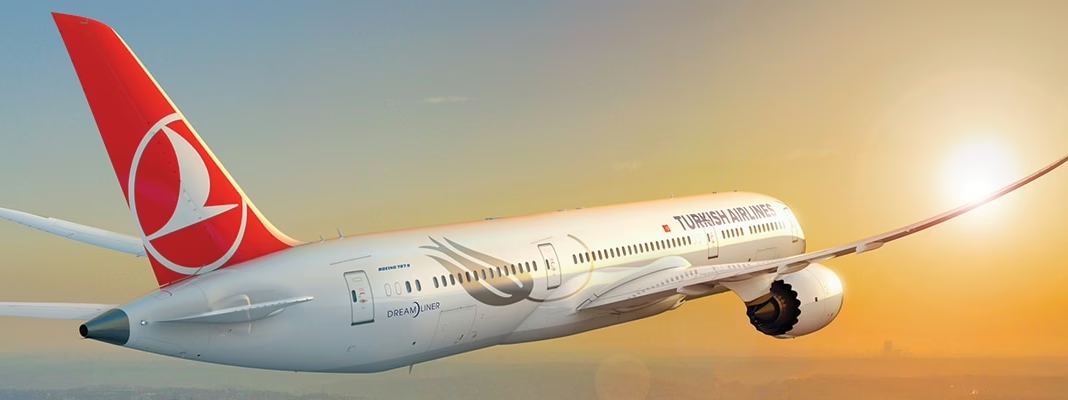National carrier aims for 800-plane milestone as it celebrates centennial anniversary amid aggressive growth strategy
Turkish Airlines plans to nearly double its fleet to 800 aircraft by 2033, adding roughly 300 planes over the next eight years as the carrier marks its 100th anniversary, company executives announced.
The Istanbul-based airline currently operates 449 commercial and cargo aircraft and expects to reach 500 planes by the end of 2025. The ambitious expansion would make Turkish Airlines one of the world’s largest fleets by aircraft count.
Chairman of the Board Prof. Ahmet Bolat said the growth stems from “strong demand dynamics across our network, the strategic advantages of Istanbul as a global hub, the expansion of new routes, the rising contribution of cargo operations, and the complementary role of our low-cost carrier AJet.”
Turkish Airlines holds a Guinness World Record for serving more countries than any other airline, flying to 131 nations across more than 350 destinations. The carrier maintains a global market share of approximately 2.3%, smaller than United Airlines’ 4.3%, but has grown faster than any other major carrier over the past decade.
Cirium data shows the airline is scheduled to operate more than 378,000 flights this year, averaging over 1,000 daily departures.
The carrier has accelerated its fleet growth significantly since 2006, when it took delivery of its 100th aircraft. The fleet doubled to 200 planes by 2012, reached 300 aircraft in 2016, and surpassed 400 planes in 2023.
“This two-brand model allows Turkish Airlines to sustain its premium positioning in global markets while capturing growth in short-haul and domestic demand,” Bolat said. “Taken together, these factors make the expansion to more than 500 aircraft by the end of 2025 both strategically compelling and operationally sound.”
Turkish Airlines operates a mixed fleet of Airbus and Boeing widebody and narrowbody aircraft, including Airbus A320 and A321neo family jets, A330s, A350-900s, Boeing 737-800s, 737 MAX 8s, 737-900ERs, 777-300ERs, and 787-9 Dreamliners.
The airline has more than 300 aircraft on order, covering the A321neo, A350, and 737 MAX 8 models. According to Planespotters.net, Turkish Airlines has taken delivery of eight new aircraft and added six more on lease so far this year.
Reports suggest the Star Alliance member is evaluating an order of approximately 225 aircraft, split between roughly 75 widebodies and 150 narrowbodies. The carrier finalized a deal with Airbus in December 2023 for 220 aircraft, consisting of 150 A321neos and 70 A350s.
“With Airbus, a portion of our sizeable order has been completed,” Bolat told aviation publication Simple Flying. “We are also continuing our negotiations with Boeing and engine companies to expand our follow-up orders. When we reach an agreement, while also complementing our fleet via leasing agreements, we believe we will be able to reach our target of 800 aircraft by 2033.”
At this year’s IATA Annual General Meeting in New Delhi, Bolat told Aviation Week that Turkish Airlines was close to finalizing major aircraft orders. “Soon we [will] know if we continue with Boeing or with Airbus. We are very close. There is a gap for the current deal,” he said. “When Turkish Airlines first said we want to order 600 aircraft, all the Gulf airlines were shocked.”
The airline is also considering a regional aircraft purchase of 20 to 30 jets, with the Embraer E2 and Airbus A220 under review.
Beyond aircraft acquisitions, Turkish Airlines is pursuing strategic investments to strengthen its global network. The carrier recently acquired a minority stake in Spanish airline Air Europa for $349 million (€300 million), viewing the investment as a faster path into Latin American markets.
“The Air Europa move is a good opportunity for us,” Bolat said during the latest earnings call. “It will be a profitable investment, and we expect a good return.”
Turkish Airlines also holds a 49% stake in Air Albania as part of its Balkans expansion strategy. The carrier maintains codeshare agreements with major global airlines including Air China, Thai Airways, Air Algérie, Air Serbia, and Vietnam Airlines to broaden its network reach.
Founded in 1933, Turkish Airlines has evolved from a domestic carrier into one of the world’s largest international airlines, leveraging Istanbul’s geographic position as a bridge between Europe, Asia, and Africa.

Key Takeaways
- Turkish Airlines plans to expand from 449 aircraft currently to 800 by 2033, adding roughly 300 planes over eight years.
- The carrier expects to reach 500 aircraft by the end of 2025 and holds a Guinness World Record for serving 131 countries.
- Turkish Airlines is evaluating orders for approximately 225 new aircraft, split between 75 widebodies and 150 narrowbodies.
- The airline recently acquired a minority stake in Spain’s Air Europa for $349 million to accelerate Latin American market entry.
- Growth is driven by strong demand, Istanbul’s hub advantages, and the complementary role of low-cost subsidiary AJet.



